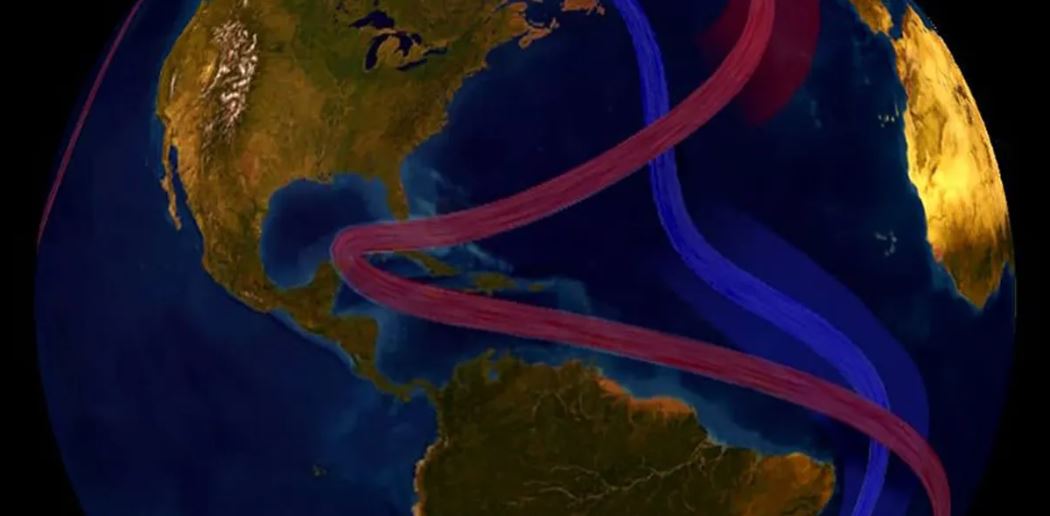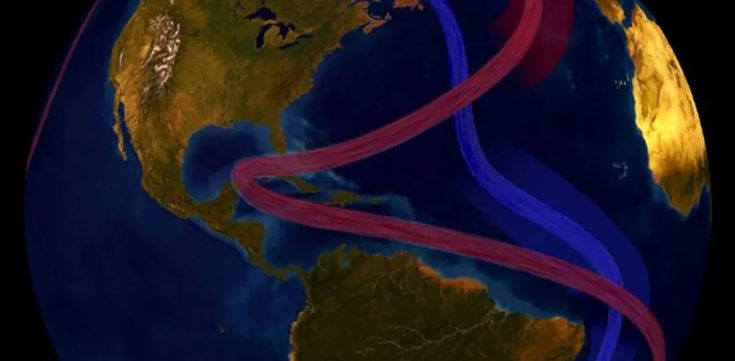

The Meridional Ocean Current (AMOC) system is part of this complex system of global ocean currents. Accordingly, cold sea water flows to the bottom, while warm water circulates on the surface, which also affects the climate of coastal areas (Image: NOAA)
Its current peripheral system AtlanticThe water, known globally as the AMOC, through which water circulates within the Atlantic Ocean, bringing warm water to the north and cold water to the south, is believed to be essential to human life. climate The Northern Hemisphere is warming, but it is also vulnerable to climate change.
Based on a new study, scientists estimate that the system is approaching a tipping point. If their findings are accurate, a collapse of the AMOC would have profound effects on global climate. AMOC plays a leading role in pushing heat and fresh water around the Atlantic Ocean through a network of deep and near-surface ocean currents.
How does AMOC affect climate?
It works by transporting warm, salty surface water from the tropics across the North Atlantic Ocean. As it approaches the North Pole, it cools and sea ice forms. The rest of the water then sinks and moves south to the depths below, completing the cycle.
By bringing warm water toward the Arctic, it helps promote warmer weather in northwestern Europe and the North Atlantic. Without the AMOC, these parts of the planet would be much cooler.
The biggest fear now is that climate change may disrupt the cycle irreparably. Several studies have indicated that the AMOC is slowing down and flowing at its weakest rate in centuries.
Likewise, most models show that the AMOC will continue to slow as the climate crisis worsens, although how strongly and quickly the change will be debated. A recent study suggests that it may collapse within decades, perhaps even years, although this claim has proven controversial.
In a new study, scientists at Utrecht University in the Netherlands claim to have found a new way to detect an early warning signal that the AMOC is approaching collapse. They ran a supercomputer model that simulated the flow of surface freshwater around the North Atlantic Ocean over 2,200 years.
The main finding is that the movement of fresh water in the Atlantic Ocean, around 34 S latitude, the southern limit of the Atlantic Ocean, can help predict the impending collapse of the AMOC. By looking at the minimum amount of fresh water moving out of this part of the South Atlantic, they were able to see if the AMOC would collapse within the next 20 years.
Answers to climate experts
When they compared the model results with real-world data, they confirmed what most other models suggest: “The current AMOC is on a reversal path.”
“The results here provide a clear answer to a long-standing problem in the climate research community regarding the presence of AMOC overturning behavior in GCM models [παγκόσμια κλιματικά μοντέλα]”, write the study authors.
“Yes, this is happening in these models. This is bad news for the climate system and humanity, since until now one might have thought that the AMOC inversion was just a theoretical concept and that the inversion would disappear once the full climate system, with all its additional responses, was taken into account.” , they conclude.
The researchers (wisely) did not specify a specific time and date for the potential tipping point, although they noted that a collapse of the AMOC would “significantly” reverse the distribution of heat in the planet's oceans and beyond. The new study was published in the journal Science Advances.

“Total alcohol fanatic. Coffee junkie. Amateur twitter evangelist. Wannabe zombie enthusiast.”





More Stories
Motorola Razr 50 Ultra Review – Review
6 Phrases That Show You’re Mentally Stronger Than Most People
Maniskin: They were honored for their overwhelming success in Greece.